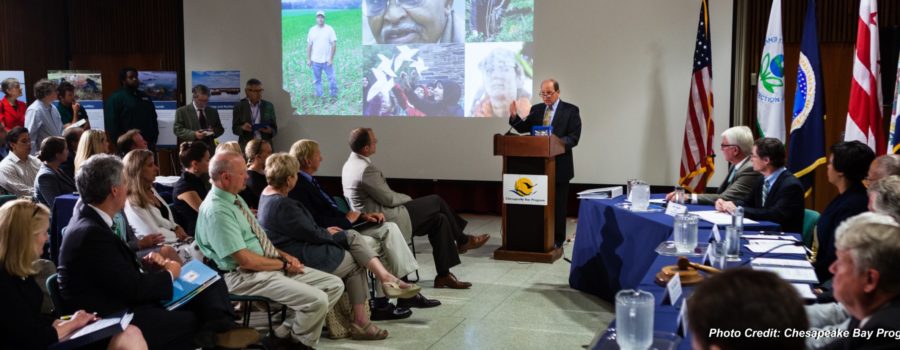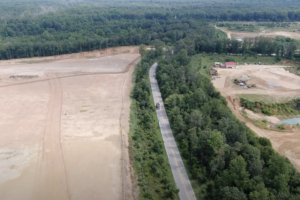Can a Government Meeting be “Open” When We Are All at Home?
public participation (n.) – any decision-making process that directly engages the public and gives full consideration to public input.
According to EPA’s Public Participation Guide, public participation “consists of a series of activities and actions by a sponsor agency over the full lifespan of a project to both inform the public and obtain input from them. Public participation affords stakeholders (those that have an interest or stake in an issue, such as individuals, interest groups, communities) the opportunity to influence decisions that affect their lives.”
____________________________________________
Public Participation & Covid-19: “Open Meeting” Requirements
Access to information and participation in the public process are essential to CLA’s work to improve the health of the Chesapeake Bay Watershed and its communities. But how does public participation work during this time of Covid-19 emergency orders and social distancing? How do government entities maintain transparency? What does an open meeting look like when we are all being asked to stay home? What are the rules that public bodies should be following?
Because of the numerous stay-at-home orders currently in place, states across the country have been forced to adjust their public processes. Below is a summary of how Maryland, Pennsylvania, and Virginia have adapted their open meeting laws (otherwise known as “Sunshine Laws”) during the Covid-19 pandemic. Also included are links to each state’s written guidance documents.
Maryland
In Maryland, any public body holding a meeting is subject to the Maryland Open Meetings Act (MD GP § 3-102)(“the Act”). Pursuant to the Act, public bodies in Maryland are allowed to hold meetings via teleconference, as long as the public is given the opportunity to observe, and at least listen. The state has developed an FAQ that explains in detail a series of “best practices” for public bodies to use to ensure that they are meeting the rules during the COVID-19 Emergency, which may be found here. The FAQ addresses holding a public meeting by teleconference, holding a closed meeting by teleconference, and under what circumstances a public body may hold an in-person meeting to which the public is only invited via teleconference.
To summarize the FAQ, the hosting party must do its best to provide the public with the best possible opportunity to observe traditionally public meetings. The FAQ provides that a public meeting may be held by teleconference as long as the meeting is available both via a virtual meeting room and telephone number. The chair may set rules for the public meeting, including not allowing the public to speak unless they are prompted. In addition, the hosting party should not admit some members of the public and exclude others.
Pennsylvania
The Pennsylvania Sunshine Act, (65 Pa.C.S. §§ 701-716), requires that public meetings should be held in public buildings with open public participation whenever possible. Recently, the Pennsylvania legislature enacted Act 15 of 2020 (“Act 15”), which clarifies rules regarding public meetings during the COVID-19 crisis. (Chapter 57(E)). The new clarifying law authorizes local government agencies to hold remote meetings during the emergency, as long as there is at least a quorum participating remotely. Those holding meetings must provide notice to the public of remote meetings “to the extent practicable,” including posting information about the meeting on the agency’s website and/or in the newspaper, including the date, time, and platform on which the meeting will be held, as well as directions as to how the public can participate. Agencies should also allow the public to participate directly in any remote meetings through tele- or video-conferencing and email and postal mail, again “to the extent practicable.” Act 15 also requires that if an emergency meeting related to COVID-19 takes place without advanced public notice, that meeting must be made available to the public within 20 days. (Note that Act 15 does not apply to school entities.)
The Pennsylvania Office of Open Records has also issued guidance recommending that any agency holding an electronic public meeting during this time record the meeting and proactively make the recording available to the public.
You can access the Pennsylvania Office of Open Records’ full guidance to Act 15 and Pennsylvania’s Sunshine Act during the COVID-19 emergency here.
Virginia
Virginia’s Freedom of Information Act (VA Code Ann. § 2.2-3708.2) specifically prohibits public bodies from meeting via electronic means except in very limited circumstances, including during a declared emergency. Additionally, Virginia law limits the decision-making of the public body during meetings conducted by electronic means to actions that address the emergency or its “anticipated effects.” Based on this statute, in an advisory opinion signed on March 20, 2020, Virginia’s Attorney General opined that:
“public bodies that are unable to assemble in person because of the unique characteristics of the COVID-19 virus … [can] make decisions that must be made immediately and where failure to do so could result in irrevocable public harm. Whether any particular action by a public body fits within that descriptions requires a fact-specific determination…”
The Attorney General went on to say “public bodies should carefully consider whether taking a given action during a meeting held by electronic communication means is truly essential and should defer any and all decisions that can be deferred until it is once again possible to meet in person.” The complete opinion can be accessed here.
The Attorney General’s guidance also requires allowing public access through electronic means and three-day public notice with the agenda. Furthermore, the minutes of the meeting must record “the nature of the emergency, the fact that the meeting was held by electronic communication means, and the type of electronic communication means by which the meeting was held” and that all votes “taken during the meeting . . . be recorded by name in roll-call fashion and included in the minutes.”
Have questions? CLA can help.
We understand that these new statutes, rules, and policies may be confusing, but CLA can help you navigate through this unprecedented time. If you have questions about Bay jurisdictions outside of Maryland, Virginia, or Pennsylvania, or have questions about a specific circumstance, please feel free to fill out our online intake form HERE.
____________________________________________

If you like this content and want to see more, please consider supporting Chesapeake Legal Alliance with a donation.




